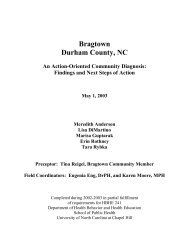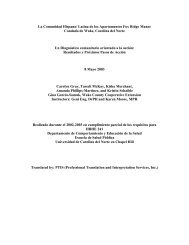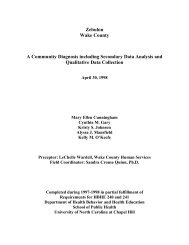The Health bulletin [serial] - University of North Carolina at Chapel Hill
The Health bulletin [serial] - University of North Carolina at Chapel Hill
The Health bulletin [serial] - University of North Carolina at Chapel Hill
Create successful ePaper yourself
Turn your PDF publications into a flip-book with our unique Google optimized e-Paper software.
January, 1927 <strong>The</strong> <strong>Health</strong> Bulletin 13<br />
tude so he never knows wh<strong>at</strong> to expect<br />
Keeping him overexcited Not<br />
giving him enough rest Giving him his<br />
way when he has a tantrum Bribing<br />
him to stop<br />
<strong>The</strong> Consfant Use <strong>of</strong> Temper Tantrums<br />
By a Child Is Ahcays the Fault<br />
<strong>of</strong> <strong>The</strong> Parent<br />
A certain proportion <strong>of</strong> temper tantrums<br />
are due to physical illness, but<br />
the vast majority are due to methods<br />
<strong>of</strong> handling. Whom shall the child p<strong>at</strong>tern<br />
after, if not the parents Did you<br />
ever stop to think wh<strong>at</strong> wintry bleakness<br />
surrounds the child if the parents<br />
are selfish, inconsider<strong>at</strong>e <strong>of</strong> each other<br />
and the children, fly into violent rages,<br />
repress all play and affection <strong>The</strong>y<br />
ii-ill be like you—much more so than<br />
you think. Indeed, grandmother can<br />
<strong>of</strong>ten tell you just how much they are<br />
as you were <strong>at</strong> their age ! So they will<br />
imit<strong>at</strong>e your temper reactions. Or, if<br />
they are all set and ready to do something<br />
and you simply say "no," giving<br />
them no outlet, they have some energy<br />
ready to go somewhere. So it <strong>of</strong>ten<br />
goes into temper.<br />
Tantrums are usually developed as a<br />
means <strong>of</strong> gaining an end. As an infant,<br />
crying <strong>at</strong>tracts <strong>at</strong>tention <strong>of</strong> various<br />
kinds. L<strong>at</strong>er this is not enough, and<br />
the child develops a temper, which<br />
forces submission from the adults. It<br />
is used more and more and becomes<br />
an established habit <strong>of</strong> reaction. It<br />
may readily be avoided. Set no p<strong>at</strong>tern.<br />
Do not yield just because the baby cries<br />
or has a tantrum. Be firm and fair<br />
and calm. Do not irrit<strong>at</strong>e the child just<br />
because you are irritable. Ignore the<br />
tantrum when it occurs, and keep on<br />
ignoring it until the child quits using<br />
it as a weapon. For th<strong>at</strong> is wh<strong>at</strong> it<br />
is—a weapon. Meanwhile, be sure the<br />
child has enough rest, sleep, play, and<br />
food. <strong>The</strong> overtired, overstimul<strong>at</strong>ed<br />
child is irritable and overactive, which<br />
produces more f<strong>at</strong>igue. Above all, do<br />
not bribe the child or try physical<br />
punishment. Ignore the tantrum ; but<br />
be sure you do not continue to set the<br />
example. It will take courage to<br />
straighten out yourself ; but it is vastly<br />
worth while.<br />
When Joseph was a baby, his mother<br />
rocked, him to sleep every night, <strong>of</strong>ten<br />
spending most <strong>of</strong> the night rocking him.<br />
Thus a fussy baby became conditioned<br />
to get everything he wanted by crying<br />
and rousing the house. Joseph's f<strong>at</strong>her<br />
is an irritable, morose man, who is<br />
annoyed by many trifles. <strong>The</strong>n he bangs<br />
the table, breaks dishes, be<strong>at</strong>s Joseph<br />
unmercifully for minor <strong>of</strong>fenses, and<br />
otherwise makes a gre<strong>at</strong> display. So<br />
Joseph copies him and tries to wreak<br />
his will and vengeance in the same way.<br />
And thus he becomes a clinic problem<br />
in tre<strong>at</strong>ment—a most difficult one in<br />
view <strong>of</strong> the example set.<br />
4. Dishonesty<br />
Do I Cause My Child To Be Dishonest<br />
By: Lying to him Lying to others<br />
in his presence: Over stimul<strong>at</strong>ing his<br />
imagin<strong>at</strong>ion Evading his questions<br />
Telling him ANYTHING to get him to<br />
do wh<strong>at</strong> I want him to do Boasting<br />
before him <strong>of</strong> some dishonest practice<br />
by which I gained an advantage Refusing<br />
him most <strong>of</strong> the things he wants<br />
Dealing out harsh tre<strong>at</strong>ment for minor<br />
<strong>of</strong>fenses Repressing all n<strong>at</strong>ural outlets<br />
for activity Shielding him from<br />
all consequences <strong>of</strong> his dishonesty<br />
Stealing, or actions which he interprets<br />
as stealing Making a hero <strong>of</strong> someone<br />
noted for dishonesty<br />
It Is Remarkably Easy to he Dishonest,<br />
Even With One's Self<br />
<strong>The</strong> habit <strong>of</strong> lying is always built up<br />
in response to the environment. Parents<br />
who are harsh in discipline, who do<br />
not stop to distinguish between the<br />
trivial and the gre<strong>at</strong>, between unavoidable<br />
mistakes and direct disobedience,<br />
who constantly expect lying (usually<br />
because <strong>of</strong> their own), are apt to have<br />
children who lie. As between telling the<br />
truth, with consequent severe discipline,<br />
and telling a lie, which may carry<br />
through, which would be the common<br />
choice Many lies are expressed in the<br />
cradle, as Mark Twain said. <strong>The</strong> unhurt<br />
baby cries for <strong>at</strong>tention—and gets<br />
it; all sorts <strong>of</strong> reactions l<strong>at</strong>er develop.<br />
Some lying has its roots in the imagin<strong>at</strong>ion.<br />
<strong>The</strong> imagin<strong>at</strong>ive life <strong>of</strong> the<br />
child is highly developed. In his play<br />
he constantly builds up his inner<br />
fancies to a point where his desires and<br />
pleasures become real to him, So, too,<br />
can he deny the unpleasant, just by<br />
words <strong>of</strong> his own arranging. In these<br />
ways we get the erection <strong>of</strong> fabrica-


![The Health bulletin [serial] - University of North Carolina at Chapel Hill](https://img.yumpu.com/33495252/19/500x640/the-health-bulletin-serial-university-of-north-carolina-at-chapel-hill.jpg)




![Bulletin of the North Carolina Board of Health [serial] - University of ...](https://img.yumpu.com/48032016/1/153x260/bulletin-of-the-north-carolina-board-of-health-serial-university-of-.jpg?quality=85)
![The Health bulletin [serial] - University of North Carolina at Chapel Hill](https://img.yumpu.com/47603625/1/169x260/the-health-bulletin-serial-university-of-north-carolina-at-chapel-hill.jpg?quality=85)
![The Health bulletin [serial] - University of North Carolina at Chapel Hill](https://img.yumpu.com/47242858/1/169x260/the-health-bulletin-serial-university-of-north-carolina-at-chapel-hill.jpg?quality=85)
![The Health bulletin [serial] - University of North Carolina at Chapel Hill](https://img.yumpu.com/43204263/1/172x260/the-health-bulletin-serial-university-of-north-carolina-at-chapel-hill.jpg?quality=85)
![The Health bulletin [serial] - University of North Carolina at Chapel Hill](https://img.yumpu.com/41981074/1/163x260/the-health-bulletin-serial-university-of-north-carolina-at-chapel-hill.jpg?quality=85)

![The Health bulletin [serial] - University of North Carolina at Chapel Hill](https://img.yumpu.com/40912928/1/164x260/the-health-bulletin-serial-university-of-north-carolina-at-chapel-hill.jpg?quality=85)

![The Health bulletin [serial] - University of North Carolina at Chapel Hill](https://img.yumpu.com/35643061/1/167x260/the-health-bulletin-serial-university-of-north-carolina-at-chapel-hill.jpg?quality=85)
![Biennial report of the North Carolina State Board of Health [serial]](https://img.yumpu.com/34024350/1/166x260/biennial-report-of-the-north-carolina-state-board-of-health-serial.jpg?quality=85)
